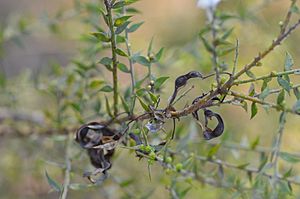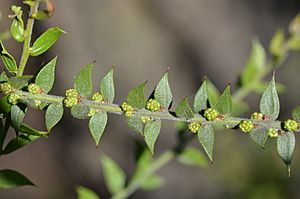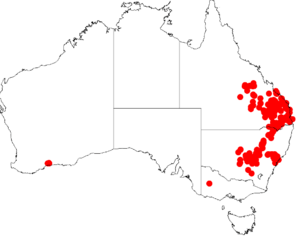Fan wattle facts for kids
Quick facts for kids Fan wattle |
|
|---|---|
 |
|
 |
|
| Scientific classification | |
| Genus: |
Acacia
|
| Species: |
amblygona
|
 |
|
| Occurrence data from AVH | |
Acacia amblygona, also known as the fan wattle or fan leaf wattle, is a cool shrub that grows in Australia. It's part of a big group of plants called Acacia which are famous for their beautiful flowers.
Contents
What the Fan Wattle Looks Like
The fan wattle is a bushy plant that can be a bit prickly. It usually grows to be about 0.4 to 1.5 metres (1 to 5 ft) tall. Its branches are round and have small ridges, and they can be a little bit hairy.
The leaves of the fan wattle are special. They are not like typical leaves; they are flattened leaf stalks called phyllodes. These phyllodes are shaped like an oval or a spearhead. They are about 0.8 to 1.5 centimetres (0.31 to 0.59 in) long and 2 to 4 millimetres (0.079 to 0.157 in) wide.
Flowers and Seed Pods
This plant blooms from July to October, showing off bright yellow flowers. These flowers grow in round clusters, with each cluster having 12 to 18 tiny flowers. Each flower cluster is about 4 to 6.5 mm (0.157 to 0.256 in) across.
After the flowers bloom, the plant forms seed pods. These pods are usually curved or twisted. They can be 3 to 7 cm (1.2 to 2.8 in) long and about 3 to 5 mm (0.118 to 0.197 in) wide.
How Scientists Classify It
The fan wattle's scientific name is Acacia amblygona. Scientists, like George Bentham, first officially described this plant in 1842. He wrote about it in a science journal called the London Journal of Botany.
Sometimes, scientists change how plants are grouped. For a while, this plant was called Racosperma amblygonum. But in 2001, it was moved back into the Acacia group. Another name it has been known by is Acacia nernstii.
Where the Fan Wattle Grows
The fan wattle is native to Australia. You can find it in different parts of the country.
In Western Australia, it grows along the south coast near a town called Ravensthorpe. It likes to grow in rocky soil there.
It also grows in New South Wales, both near the coast and further inland. You can find it north of Lake Cargelligo. The plant's range also extends into the southern parts of Queensland.

